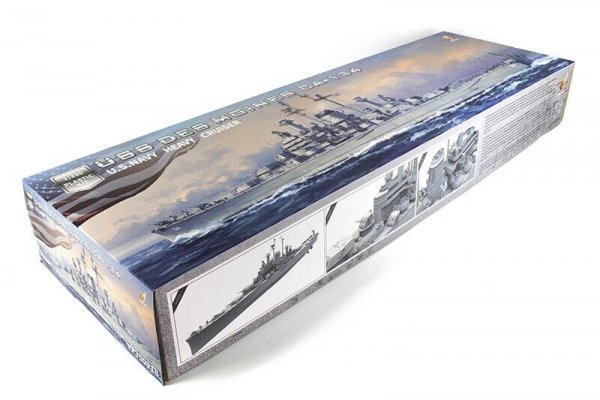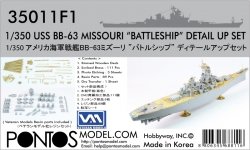-
Załączniki bezpieczeństwa
Załczniki do produktuZałączniki dotyczące bezpieczeństwa produktu zawierają informacje o opakowaniu produktu i mogą dostarczać kluczowych informacji dotyczących bezpieczeństwa konkretnego produktu
-
Informacje o producencie
Informacje o producencieInformacje dotyczące produktu obejmują adres i powiązane dane producenta produktu.Very Fire
-
Osoba odpowiedzialna w UE
Osoba odpowiedzialna w UEPodmiot gospodarczy z siedzibą w UE zapewniający zgodność produktu z wymaganymi przepisami.
Very Fire VF350918DX USS Des Moines CA-134 1/350
Model statku 1/350
USS Des Moines (CA-134) – jeden z trzech amerykańskich ciężkich krążowników typu Des Moines, który wszedł do służby już po zakończeniu II wojny światowej. Były to ostatnie amerykańskie krążowniki uzbrojone tylko w artylerię lufową.
Krążownik został zwodowany 27 września 1946 roku w stoczni Fore River należącej do Bethlehem Steel Corporation w Quincy (Massachusetts) a 16 listopada 1948 roku oddany do służby w US Navy. Pierwszym dowódcą okrętu był komandor A. D. Chandler. Między 1949 a 1957 rokiem, co roku pełnił służbę na morzu śródziemnym jako okręt flagowy 6 floty. W 1952 roku a także od 1954 do 1957 odbywał rejsy szkoleniowe zawijając do portów Europy Północnej. W 1952, 1953 i 1955 roku krążownik brał udział w manewrach floty NATO. Ostatni raz był okrętem flagowym 6 floty w okresie od lutego 1958 roku do czerwca 1961 roku. 14 lipca 1961 roku krążownik został wycofany do rezerwy, zacumowany w Filadelfii i zakonserwowany. W 2006 roku okręt zaholowano do Brownsville w Teksasie gdzie został zezłomowany.
USS Des Moines (CA-134) was the lead ship of the class of United States Navy heavy cruisers. She was the first ship in the United States Navy to feature the auto loading Mark 16 8-inch/55 caliber gun, the first of its type in the world, and the second ship of its name in the U.S. Navy.Des Moines was launched 27 September 1946 by Bethlehem Steel Company, Fore River Shipyard, Quincy, Massachusetts; sponsored by Mrs. E. T. Meredith, Jr.; and commissioned 16 November 1948, Captain A. D. Chandler in command. She became the first of her class to mount the semi-automatic Mark 16 8-inch turrets [1] and carry the new Sikorsky HO3S-1 utility helicopters in place of seaplanes. She was named after the capital of the state of Iowa.In a varied operating schedule designed to maintain the readiness of the Navy to meet the constant demands of defense and foreign policy, Des Moines cruised from her home port at Newport, Rhode Island and after 1950, from Norfolk, Virginia on exercises of every type in the Caribbean, along the East Coast, in the Mediterranean Sea, and in North Atlantic waters. Annually between 1949 and 1957 she deployed to the Mediterranean, during the first seven years serving as flagship for the 6th Task Fleet (known as the 6th Fleet from 1950). In 1952, and each year from 1954 to 1957, she carried midshipmen for summer training cruises, crossing to Northern European ports on the first four cruises. She also sailed to Northern Europe on NATO exercises in 1952, 1953, and 1955. On 18 February 1958, she cleared Norfolk for the Mediterranean once more, this time to remain as flagship for the 6th Fleet until July 1961 when was placed out of commission in reserve.
Through her Mediterranean services Des Moines contributed significantly to the success of the 6th Fleet in representing American power and interests in the countries of Southern Europe, Northern Africa, and the Near East. She made this contribution through such activities as her participation in NATO Mediterranean exercises; her call to seldom-visited Rijeka, Yugoslavia, in December 1950 and Dubrovnik, Yugoslavia, in May 1960, and to many other ports as a regular feature of her schedule; her cruising in the eastern Atlantic during the wake of the Suez Crisis of 1956; and service on patrol and as control center for American forces in the Lebanon crisis of 1958. Film footage of her cruising with other ships of the United States 6th Fleet was used in the introduction and conclusion of the movie John Paul Jones, starring Robert Stack (Warner Brothers 1959).


















 9 szt.
9 szt.
 4 szt.
4 szt.





 3 szt.
3 szt.